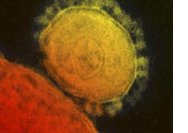Feedback/Comments from Our Readers
|
 Comments, questions and feedback is always welcome. Comments, questions and feedback is always welcome.
With summer approaching we have decided to send out a monthly version of the Global Health Weekly. It will return as a weekly newsletter mid August 2018.
|
|
Thanks to everyone for taking their time to come and join Global Health Rounds with us this year. With everyone's busy day to day schedule we are going to wrap up this year's Academic year. We look forward to the next upcoming academic year.
We're always looking for new speakers and ideas for topics for Global Health Rounds for the new coming up academic year in the Fall 2018. If you have speakers or topics, please contact Cheryl Knowles at GHFoMD@ualberta.ca. |
|
First Mers virus case of 2018 detected in UAE
|
 A new Middle East Respiratory Syndrome (Mers-CoV) virus patient has been confirmed in the UAE, according to World Health Organization.
The patient - a 78-year-old man - was suffering from fever, cough and shortness of breath since May 4 and was brought to hospital on May 13. He had recently travelled to Saudi Arabia and also owned a camel farm in Gayathi, UAE, which he visited on daily basis, WHO said on Tuesday.
Also suffering from hypertension and interstitial lung disease as underlying conditions, the patient was tested positive for Mers-CoV at the Sheikh Khalifa Medical Centre laboratory and is currently in stable condition at the hospital.
|
|
The World Is Dangerously Lowballing The Economic Cost Of Climate Change, Study Finds
|
Leading global forecasts widely underestimate the future costs of climate change, a new paper warns.
The findings, to be released Monday in the Review of Environmental Economics and Policy, say projections used by the United Nations Intergovernmental Panel on Climate Change rely on outdated models and fail to account for “tipping points” ― key moments when global warming rapidly speeds up and becomes irreversible.
The IPCC, established in 1988, is the leading international body for assessing climate change, and took on an expanded role after every country on Earth signed the Paris Agreement, the first global pact to cut greenhouse gas emissions. By relying on inaccurate economic models, the organization is misleading policymakers around the world about the risks of climate change, according to the researchers at the Environmental Defense Fund, Harvard University and the London School of Economics who co-authored the paper.
To read more about this article go to https://www.huffingtonpost.ca
|
|
Nipah Virus, Rare and Dangerous, Spreads in India
|
 A rare, brain-damaging virus that experts consider a possible epidemic threat has broken out in the state of Kerala, India, for the first time, infecting at least 18 people and killing 17 of them, according to the World Health Organization.
The Nipah virus naturally resides in fruit bats across South and Southeast Asia, and can spread to humans through contact with the animals’ bodily fluids. There is no vaccine and no cure.
The virus is listed by the W.H.O. as a high priority for research. Current treatment measures are insufficient, according to Dr. Stuart Nichol, the head of the viral special pathogens branch at the Centers for Disease Control and Prevention.
“There’s a market failure for protecting people from this,” said Dr. Steve Luby, an epidemiologist at Stanford University. “It’s not like treating baldness or breast cancer, where wealthy people will pay for your product. There’s no big customer here, no incentive, until it escalates.”
|
|
Now is the time to focus on non-communicable diseases
|
Non-communicable diseases (NCDs) such as stroke, heart disease, diabetes, chronic respiratory disease, and cancer account for over 70% of all deaths, of which nearly half are in people younger than 60 years. The Sustainable Development Goals commit countries to reducing premature mortality from NCDs by a third (SDG 3.4). After too many years of inaction, 2018 must be a pivotal year for progress towards the defeat of NCDs.
The Lancet believes that great research requires development, mobilisation, and exposure. We intend to do just that with a year-long focus on NCDs.
In the lead up to the third UN High-Level Meeting on NCDs, the Lancet family of journals will publish several major initiatives to ensure the best evidence is at the heart of policies to reduce the global burden of NCDs.
To read more about this journal go to http://info.thelancet.com
|
|
Ebola Erupts Again in Africa, Only Now There’s a Vaccine
|
 Ebola has erupted again in the Democratic Republic of Congo, the country’s ninth outbreak since the virus was discovered there in 1976, and world health officials are moving unusually swiftly to contain the outbreak.
Two days after a laboratory confirmed that the virus had killed two people in the remote Equateur Province, teams from the country’s health department, along with doctors from the World Health Organization and Doctors Without Borders, had reached Bikoro, a market town about 20 miles from Ikoko Ipenge, the village at the outbreak’s epicenter.
The teams are expected to have a 15-bed treatment center and a mobile laboratory in place by this weekend, said Dr. Peter Salama, the W.H.O.’s deputy director general for emergency response.
To read more about this article go to https://www.nytimes.com
|
|
|
|
Save the Dates of Local Events!
|
Global Health Rounds
to return in the Fall 2018
|
|
Conferences, Symposiums & Lectures
|
Save this link to your favorites as I update it daily will all events, symposiums, etc., just click here.
CUGH 2019 Global Health Conference Translation
and Implementation
for Impact in Global Health
Date: March 8 - 10, 2019
Where: Hilton Chicago Hotel
|
|
Call for Abstracts/Submissions
|
|
Details to follow in the Fall Term 2018
|
|
Newsletter & Special Journal Editions
|
|
|